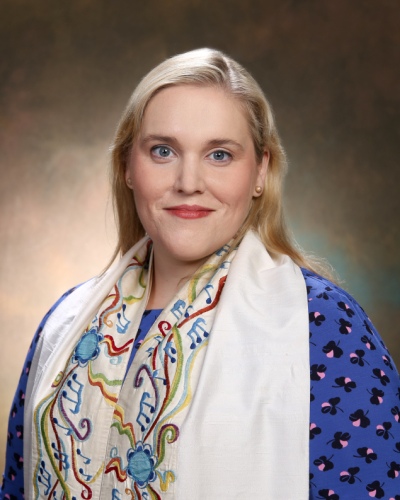Sometimes one finds themselves in exactly the right place at the right time. Jewish custom might designate circumstances like these as bashert – meant to be. Some of us see such blessings as mere coincidence and others ascribe deeper meaning to moments that simply feel bashert, as an affirmation of the mystery of creation.
I have had times throughout my life when I have felt a sense of synchronicity that I would describe as bashert. Chief among these would be the circumstances that brought me to Charlotte the first time as a young adult. I was exactly where I needed to be at that point in my life and it was entirely by chance.
Early in February, I had a similar experience. By mere circumstance of geography, I was asked to attend a very unique and special event on behalf of the American Conference of Cantors and the Religious Action Center. The ask was simply, “We need a cantor in Raleigh next week. Can you be there?”
They called me, you see, because I am the only Reform-ordained cantor serving a URJ congregation in the Carolinas. I just happened to be the closest person. (That said, I am also a committee chair for the American Conference of Cantors and will take a seat on their Board next year – so they also know that I am up for a challenge when needed.) I am so fortunate to work at a synagogue where we have always answered the call from our Movement when we are uniquely needed. So, in short order, we arranged for coverage for my schedule and I was off to Raleigh.
I spent two days attending a significant portion of the National Theomusicology and Movement Arts Convening for the Poor People’s Campaign: A National Call for Moral Revival. The program brought together about 100 musicians, visual artists, dancers, spiritual leaders, organizers, and documentarians from over 30 states. Participants journeyed from as far as Alaska to join together for these days of learning, music, and community in Raleigh.
The Convening was a fascinating window in to the world of the Poor People’s Campaign, led by Reverend Doctors William Barber and Liz Theoharis. Barber and Theoharis cochair today’s PPC, a call for moral revival drawing on the tradition of the Dr. King’s 1968 Poor People’s Campaign.
The purpose of the Convening was to disseminate new and revived social justice and protest songs throughout the country, insuring that the Poor People’s Campaign would have a single sound. The PPC deeply values the role that music, arts, and culture play at uniting people and that they intend to use specific music to unite the movement across the nation as they work to shift the national moral narrative this spring.
Three new songs were the primary focus of the Convening and several of the songs from the 1968 campaign were reinforced to participants. The program leadership described three means of dissemination: through the Convening participants, through simple music videos that were filmed during the days in Raleigh, many of which are already on facebook, and finally in a forthcoming songbook.
The music that was introduced is simple and chant-like. It is meant to be used to galvanize the steps of those who protest, anchor one’s sense of purpose. If you search the hashtag #poorpeoplescampaign on facebook or other social media, you will find many videos of this and other songs of protest.
For me, personally, this was a very valuable experience creatively and spiritually. It was refreshing and invigorating to make music with such a diverse group of talented and committed leaders. As a cantor, I rarely have the opportunity to spend time with artistic colleagues outside of the circle of the Reform movement. Musically, this is was inspiring. Furthermore, I cannot think of a time in my adult life when I was able to spend that much time in close and creative relationship with people from outside of my particular bubble. It stretched me, grounded me, and provided me with a renewed sense of purpose.
And to you, Temple Beth El, I am so grateful for your support on such short notice to serve the greater Reform Jewish community in this unique and – truly – once-in-a-lifetime way. While answering the call to serve, I too was enriched. On these particular days in February, I felt as if my presence in Raleigh was bashert – it was somehow meant to be. Thank you for the space to follow a call. I am very grateful.




